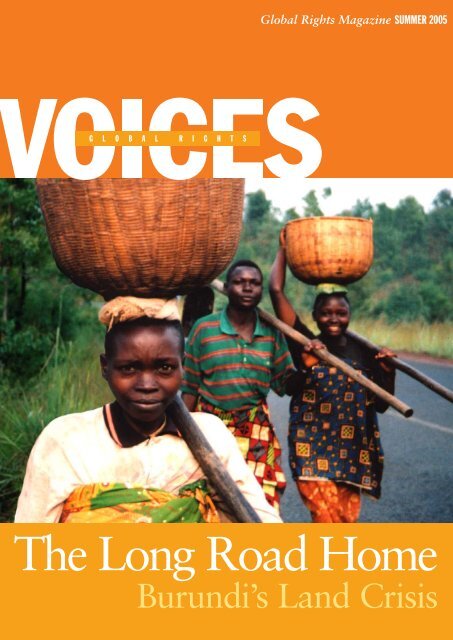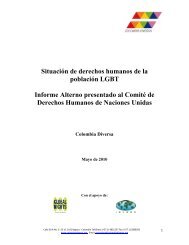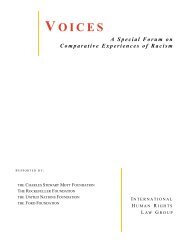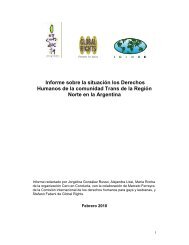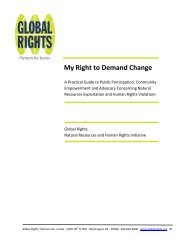The Long Road Home - Global Rights
The Long Road Home - Global Rights
The Long Road Home - Global Rights
Create successful ePaper yourself
Turn your PDF publications into a flip-book with our unique Google optimized e-Paper software.
G L O B A L R I G H T S<br />
<strong>Global</strong> <strong>Rights</strong> Magazine SUMMER 2005<br />
<strong>The</strong> <strong>Long</strong> <strong>Road</strong> <strong>Home</strong><br />
Burundi’s Land Crisis
Photos by Maria Koulouris<br />
C O V E R S T O R Y<br />
4 Summer 2005 <strong>Global</strong> <strong>Rights</strong> VOICES<br />
<strong>The</strong><br />
In 1972, when Etienne* was just<br />
five years old, a brutal campaign<br />
of ethnic violence swept Burundi,<br />
engulfing his village in the country’s<br />
north. Etienne’s mother, in an<br />
attempt to avoid the cruel fate of so<br />
many of her compatriots, fled to<br />
neighboring Rwanda with seven<br />
children in tow. <strong>The</strong> family left<br />
behind two parcels of land.<br />
Twenty-one years later, after<br />
historical elections brought Burundi’s<br />
first Hutu president to power,<br />
Etienne’s family, feeling hopeful for<br />
the future of their country, decided<br />
the time had come to return home.<br />
But upon arrival in Burundi, they<br />
quickly found that they had no land<br />
to which they could return. <strong>The</strong>ir<br />
primary family home had been<br />
illegally occupied, the second one<br />
was destroyed during the fighting<br />
they had fled.<br />
Seeking to reclaim what had been<br />
legally theirs, Etienne turned to the<br />
local governor for help. Recognizing<br />
the family’s right to the land, the<br />
governor ordered the new tenant off<br />
the disputed property. But the home’s<br />
wealthy new occupant simply<br />
*Names have been changed.<br />
<strong>Long</strong><br />
<strong>Road</strong><br />
<strong>Home</strong><br />
ignored the governor’s demand.<br />
Etienne’s family received no<br />
compensation for its loss and was<br />
soon forced to scatter across the<br />
country, each member settling<br />
wherever he or she could find work.<br />
Twelve years later, Etienne now<br />
scrapes together just enough money<br />
to pay his rent, unable to save enough<br />
to buy new land or rebuild his<br />
family’s property.<br />
Conflicts over land are all too<br />
common among the people of<br />
Burundi, a small landlocked country<br />
that borders Rwanda, Tanzania, and<br />
the Democratic Republic of Congo.<br />
With the country’s 6.8 million<br />
people living in an area<br />
approximately the size of Maryland,<br />
population density is the second<br />
highest on mainland Africa. <strong>The</strong><br />
population is growing at the<br />
staggering rate of three percent a year<br />
— a figure that, if maintained, will<br />
mean a doubling of the population<br />
every two decades. And although<br />
only 44 percent of Burundi’s land is<br />
arable, more than 90 percent of the<br />
population lives in the rural<br />
countryside (which begins just<br />
minutes outside the capital<br />
Bujumbura) and relies on agriculture<br />
for their subsistence. Per capita yearly<br />
income is just $100 and there are few<br />
other ways to earn a living.<br />
Family disagreements over the<br />
inheritance and sharing of property<br />
and the repeated sub-division of land<br />
into ever-smaller parcels are a source<br />
of conflict throughout the country.<br />
Compounding this problem,<br />
Burundi’s successive governments<br />
have poorly managed official land<br />
policies for decades, and Burundians<br />
— most of whom have been dissuaded<br />
by the lack of opportunity to raise<br />
their individual concerns in a<br />
traditionally centralized society —<br />
have not, for the most part, engaged<br />
local authorities on the issue.<br />
Making Burundi’s land issue even<br />
more complex, cycles of violence<br />
have forced several waves of<br />
refugees to flee their homes and,<br />
upon their return, serious disputes<br />
have arisen over the land left<br />
behind. <strong>The</strong>se disputes, many of<br />
which involve illegal occupations<br />
and state expropriations, threaten<br />
Burundi’s bid for a peaceful and<br />
stable future.
Burundi’s Land Crisis<br />
Today, with the country now enjoying<br />
peace for the first time in decades, the<br />
number of people who may soon return<br />
home is staggering. In April 2004,<br />
roughly 140,000 Burundians still resided<br />
in the country’s internally displaced<br />
persons camps; at the end of the year,<br />
almost three quarters of a million<br />
remained in Tanzania. <strong>The</strong>se figures<br />
indicate that as the situation in Burundi<br />
improves, nearly one in eight of the<br />
country’s citizens may soon embark on a<br />
return from exile. But according to<br />
Refugees International, more than 95<br />
percent of these displaced Burundians<br />
have no home to which they can return.<br />
History of the Conflict<br />
<strong>The</strong> 1972 violence from which Etienne’s<br />
family fled came just a decade after<br />
Burundi gained its independence from<br />
Belgium, a colonial power that had<br />
privileged the country’s minority Tutsi<br />
population and marginalized the majority<br />
Hutus. In the years leading up to the<br />
violence, a small sub-clan of Tutsis seized<br />
power in a bloody coup and stripped<br />
Hutus of all positions of authority. When<br />
the Hutus revolted, their efforts were met<br />
with disproportionate and systematic<br />
violence from the Tutsi-dominated<br />
military. In the fighting that ensued, about<br />
200,000 Burundians were killed.Hundreds<br />
of thousands of others,like Etienne’s family,<br />
fled to neighboring countries, leaving<br />
behind their land and property.<br />
In the years that followed, this land and<br />
property were illegally occupied,looted or,<br />
in many cases, expropriated by the state. In<br />
the southern city of Rumonge, for<br />
example, where valuable palm plantations<br />
dot the hills, the government seized<br />
property and arbitrarily distributed it to<br />
select businesses and powerful individuals.<br />
Elsewhere, people simply occupied the<br />
empty homes of those who had fled.And<br />
conflict continued unabated.<br />
In 1993, for the first time in Burundi’s<br />
history, a Hutu was elected to the<br />
country’s presidency. Before long, he<br />
began to urge those who had fled the<br />
violence to return home.A generation of<br />
refugees saw hope in this change and<br />
some, like Etienne’s family, began their<br />
journey back to Burundi.<br />
Just months after his election, however,<br />
the president and several members of his<br />
administration were assassinated —<br />
sparking what would beome a 12 year<br />
civil war. It is said that these killings were<br />
motivated, in part, by the government’s<br />
handling of land conflicts. About 300,000<br />
men, women, and children died in this<br />
wave of violence, and 800,000 were<br />
displaced from their homes. Many of<br />
these people fled to neighboring<br />
Tanzania, while others were displaced<br />
within Burundi, settling in squalid camps.<br />
Like those who had fled previous periods<br />
of conflict, these Burundians left behind<br />
property that was soon taken over, adding<br />
yet another layer to the country’s already<br />
serious land crisis.<br />
In 2000, things began to improve when<br />
the warring parties signed the Arusha<br />
Agreement, a comprehensive peace<br />
settlement. Even more significantly, the<br />
government and main rebel groups<br />
agreed to a critical ceasfire. And in early<br />
2005 the country held a peaceful<br />
referendum on its post-transition<br />
constitution, which includes a powersharing<br />
system between Hutus and Tutsis.<br />
A Truth and Reconciliation Commission<br />
has been established,the security situation<br />
has improved drastically, and general<br />
elections will begin in June 2005. With<br />
the possibility of peace now on the<br />
horizon, those forced to flee Burundi’s<br />
waves of conflicts have again begun to<br />
return home.<br />
<strong>Long</strong> <strong>Road</strong> <strong>Home</strong>, continued on page 6<br />
<strong>Global</strong> <strong>Rights</strong> VOICES Summer 2005 5
<strong>Long</strong> <strong>Road</strong> <strong>Home</strong>, continued from page 5<br />
Counselors and paralegals offer advice, Butarugera zone, province of Muyinga.<br />
But Burundi’s government seems ill-prepared to deal with<br />
all of the country’s potential returnees. “<strong>The</strong> government’s<br />
attempts to deal with the land issue have been weak, at best,”<br />
said Rene Claude Niyonkuru, of the Ngozi-based<br />
Association for Peace and Human <strong>Rights</strong>, a <strong>Global</strong> <strong>Rights</strong><br />
partner. “<strong>The</strong> Arusha Agreement established a National<br />
Committee for the Rehabilitation of Victims to address<br />
conflicts over land, but it has been understaffed,<br />
underfunded and ineffective.”<br />
Adding to the problem, Burundi lacks harmonized land<br />
laws or a comprehensive land policy and instead relies on<br />
HELPING A COMMUNITY HEAL<br />
6 Summer 2005 <strong>Global</strong> <strong>Rights</strong> VOICES<br />
P artners for Justice SPEAK OUT<br />
EMMANUEL NDABUMVIRUBUSA<br />
Paralegal<br />
Muyinga, Burundi<br />
In 2000, visitors from <strong>Global</strong> <strong>Rights</strong> came to my community in<br />
Muyinga to talk about how they wanted to help people resolve their<br />
problems through legal clinics. <strong>The</strong>y suggested that we elect<br />
persons from our colline (hill) whom we regarded as leaders, to be<br />
trained in problem solving at the community level. In selecting<br />
these people, we were asked to take into account integrity,<br />
morals, and the person’s capacity to relate to others. We also<br />
were asked to specifically consider the inclusion of the women and<br />
minorities among us.<br />
At the time, I was a farmer and had been only to primary school.<br />
But still, I was fortunate enough to be selected. Now, I serve my<br />
community as a trained paralegal, a role that I believe is<br />
important. Most of the problems that I help resolve are land<br />
conflicts, especially related to returnees whose land has been<br />
custom and outdated legislation. This includes the 1986<br />
Land Act, which grants legal title to whomever occupies<br />
land for at least 30 years, if no claims are made within two<br />
to three years of this period — regardless of how the land<br />
was obtained. <strong>The</strong> lack of coherent rules governing land<br />
ownership has had significant implications for people like<br />
Etienne. As Mr. Niyonkuru explained, “If Burundi is ever<br />
to address the enormity of its land crisis, a review of these<br />
laws and policies is critical.”<br />
As it stands, Burundi’s courts have not been effective in<br />
resolving land disputes. Although 80 percent of the<br />
contentious cases in the country’s judicial system involve<br />
conflicts over land, few Burundians have confidence in<br />
court verdicts, fewer than half of which are ever enforced.<br />
And for most people, even flawed legal proceedings are too<br />
lengthy, complex, and expensive to pursue. Etienne, for<br />
instance, says he has avoided the courts because the man<br />
living in his family’s home could afford the legal<br />
representation that Etienne could not. And Bashinganhahe,<br />
local elders who historically resolved disputes out of court,<br />
have begun to charge for their services, causing many<br />
Burundians to question their impartiality.<br />
How <strong>Global</strong> <strong>Rights</strong> Helps<br />
In an attempt to address these problems, <strong>Global</strong> <strong>Rights</strong>’<br />
Burundi program established both stationary and mobile<br />
clinics in Muyinga, Kirundo, and Ngozi provinces to help<br />
illegally occupied. Such problems are increasing as more people<br />
return to Burundi from neighboring countries. In Burundi, land is<br />
extremely important — it is what allows the population to eat, to<br />
survive. Most Burundians are farmers like me.<br />
I help mediate conflicts in my community and put people in touch<br />
with the appropriate authorities so that time and resources are not<br />
wasted seeking help from the wrong places. I also received training<br />
on listening skills and counseling people. <strong>The</strong> benefit of this kind of<br />
work is that it contributes directly to the community. Without this<br />
assistance, many people would have difficulty solving their<br />
problems. It feels very satisfying to be able to assist them.<br />
Mediation is particularly welcomed by local populations. Judicial<br />
proceedings are often lengthy and costly and many people don’t<br />
have the time or resources to go through the courts. Mediation, on<br />
the other hand, is less confrontational and takes less time than<br />
court proceedings. Parties are happy to have successful mediations<br />
because it means that they have reached an agreement In Burundi,<br />
we often say that a bad agreement is worth more than the<br />
imposition of a good decision.<br />
<strong>The</strong> training that I received from <strong>Global</strong> <strong>Rights</strong> has allowed me to fill<br />
gaps in my understanding of the law. Before, my community often<br />
relied solely on custom. That now has changed. Ten years from now,<br />
I hope people have even more trust in paralegals to help them<br />
resolve disputes. And I hope that through my work they also have a<br />
better understanding of their own human rights.
people solve their legal issues, most of which are landrelated.<br />
Staffed by full-time counselors, these clinics serve<br />
hundreds of clients each month, sometimes traveling to<br />
remote areas to reach people who otherwise would be<br />
unable to seek assistance. <strong>The</strong> counselors familiarize<br />
people with their rights, help mediate conflicts, and train<br />
paralegals — Burundians elected by their communities<br />
because of their integrity and fairness — to serve as local<br />
leaders.After learning about relevant aspects of Burundian<br />
law, including the Family Code and the Land Law, these<br />
paralegals are able to inform people about their rights and<br />
help them resolve their disputes. When paralegals are<br />
unable to solve a problem, they turn to the legal clinics<br />
established by <strong>Global</strong> <strong>Rights</strong> for support.<br />
<strong>Global</strong> <strong>Rights</strong> recently handed over two of these clinics<br />
to partner organizations, and has gradually shifted its<br />
focus to building the capacity of local NGOs to do the<br />
legal clinic work themselves. <strong>Global</strong> <strong>Rights</strong> has done this<br />
through training, mentoring, and creating legal networks<br />
that allow partners to work with and learn from one<br />
another. Says Louis-Marie Nindorera, <strong>Global</strong> <strong>Rights</strong>’<br />
Burundi country director,“After several years of running<br />
legal clinics, <strong>Global</strong> <strong>Rights</strong> has the privilege of now<br />
being able to share its experience with local NGOs that<br />
are providing similar services to their communities.”<br />
<strong>The</strong>se clinics provide much-needed assistance. Sylvestre<br />
Mpawenayo, a counselor at <strong>Global</strong> <strong>Rights</strong>’ legal clinic in<br />
Ngozi, explained: “We often say in Burundi that justice<br />
is ill.With such a huge problem of poverty in Burundi,<br />
people are afraid to bring cases before the courts because<br />
they don’t have the means. Others are simply ignorant of<br />
their rights and when they have a problem they don’t<br />
know where to turn. <strong>The</strong> legal clinics are a source of<br />
information for common people. When we are able to<br />
help them by informing them of their rights, directing<br />
them to the appropriate authorities, or resolving their<br />
disputes, through mediation for instance, it is to the<br />
advantage of everyone and the parties pay nothing.”<br />
Moreover, stated Mathilde*, one of the clinic’s clients:<br />
“Paralegals are people who have accepted a certain level<br />
of legal responsibility vis-à-vis their community.<strong>The</strong>y are<br />
people whom we can trust.”<br />
Just last year, <strong>Global</strong> <strong>Rights</strong>-trained paralegals successfully<br />
obtained reparations for 24 families from Ngozi whose<br />
land had been expropriated by the government in 1992.<br />
Under Burundi’s Constitution, expropriation is legal if<br />
carried out in the public interest.Yet in reality, much of<br />
the confiscated land has been transferred to powerful<br />
military or political elites without compensation to the<br />
owners.And, in the years since the expropriations, much<br />
of this land has continued to change hands.Today, many<br />
of the original owners want to return, while those who<br />
purchased the land and hold title to it are reluctant to<br />
give away what they see as rightfully theirs.<br />
<strong>Long</strong> <strong>Road</strong> <strong>Home</strong>, continued on page 18<br />
Partners for Justice SPEAK OUT<br />
LUCIE NIZIGAMA<br />
Association of Women Lawyers<br />
Bujumbura, Burundi<br />
PROMOTING WOMEN’S LAND RIGHTS<br />
I think my desire to help women stems from my childhood.<br />
After my father passed away, his siblings took all of my<br />
family’s land. My mother was left with only a tiny parcel on<br />
which to raise our family. She struggled before the courts for<br />
years to obtain justice for us. Ever since then, I have felt that<br />
I wanted to do something to help women in similar situations.<br />
Early in my career, I was the first female magistrate in Karusi<br />
province. Almost all of the conflicts that came before me were<br />
land-related, and most had to do with inheritance disputes.<br />
Most often, a widow would initiate a case against her brotherin-law<br />
after he tried to take away all of her deceased<br />
husband’s land. I constantly was troubled by the fact that<br />
women in my courtroom were unable to express their<br />
concerns adequately.<br />
I decided to join the Association of Women Lawyers because<br />
I wanted to work directly with women on land-related issues. I<br />
have found that when local associations stand behind<br />
common people, authorities are more likely to resolve<br />
conflicts properly. Although the organization is now focused<br />
primarily on handling individual cases, we also are trying to<br />
influence public policy. Currently, we are working on a law<br />
protecting women’s inheritance rights.<br />
Through the networks it has developed, <strong>Global</strong> <strong>Rights</strong> has<br />
increased our ability to help people. One network in which we<br />
participate is designed for Burundian NGOs that run legal<br />
clinics for indigent communities. That network allows us to<br />
share experiences, learn from one another, and develop joint<br />
strategies. <strong>Global</strong> <strong>Rights</strong> also provides us with technical<br />
training in areas such as listening, mediation, and advocacy.<br />
With these tools, we are better able to serve our<br />
communities.<br />
<strong>The</strong> second <strong>Global</strong> <strong>Rights</strong> network in which we participate is<br />
for local organizations that want to influence lawmakers on<br />
specific human rights issues. Together, we already have<br />
proposed amendments to key pieces of legislation, such as<br />
the law establishing the Truth and Reconciliation<br />
Commission, the Electoral Law, and the Constitution. This<br />
type of work is new to most Burundian NGOs. But as the<br />
political context has changed and opportunities now exist for<br />
such initiatives, we have learned to do it by working alongside<br />
<strong>Global</strong> <strong>Rights</strong>.<br />
As part of these networks, we are better able to push our<br />
government to respect human rights. And pursuing these<br />
activities makes us feel strong. Slowly but surely, we can<br />
sense that our positions are being taken more seriously.<br />
<strong>Global</strong> <strong>Rights</strong> VOICES Summer 2005 7
<strong>Global</strong> <strong>Rights</strong> in BURUNDI<br />
INHERITING LAND<br />
“When one speaks of problems related to inheritance<br />
rights, we think immediately of land because land<br />
equals survival in Burundi,” says Espérance<br />
Musirimu, <strong>Global</strong> <strong>Rights</strong>’ program officer in<br />
Bujumbura. “Families never really quarrel about<br />
inheritance of any other belongings. Land is always<br />
the issue.”<br />
Because there is no codified inheritance law in<br />
Burundi, the issue is regulated by custom. And while<br />
custom varies from province to province, in most<br />
cases, women are at a distinct disadvantage. When a<br />
man dies, for example, custom in a number of areas<br />
dictates that his land is divided between only his<br />
male heirs. In other regions, women may inherit land,<br />
but only parcels half the size of what their male family<br />
members may get and without the right to sell what<br />
has been left to them. <strong>The</strong> case is particularly dire for<br />
widows, women abandoned by their husbands, and<br />
female divorcees whose land is frequently taken by<br />
their husbands or his family. Such a reality<br />
undermines the economic rights of Burundi’s women<br />
and diminishes strides toward gender equality.<br />
“<strong>The</strong>se problems are so prevalent that we assist<br />
female clients who are seeking to resolve<br />
inheritance-related land disputes on a daily basis,”<br />
said Clotilde Ngendakumana, program associate in<br />
<strong>Global</strong> <strong>Rights</strong>’ Ngozi legal clinic. “And in addition to<br />
providing legal services, we are now working with the<br />
Association des Femmes Juristes (Association of<br />
Women Lawyers) and a broader network of local<br />
NGOs to push for a national inheritance bill that would<br />
guarantee equality for women.”<br />
While women face disproportionate discrimination<br />
when it comes to inheriting land, the customs that<br />
regulate the issue cause problems for all Burundians,<br />
including men — signaling the need for<br />
comprehensive land policy reforms. As the population<br />
grows and parcels of land are sub-divided among<br />
heirs into ever-smaller plots that are no longer large<br />
enough for cultivating sufficient foodstuffs, the land<br />
loses its value. Donna-Fabiola Nshimirimana, <strong>Global</strong><br />
<strong>Rights</strong>’ program officer in Ngozi, explained: “A parcel<br />
of land that has been handed down to one man from<br />
his father will need to be divided between his<br />
offspring as well, and in most cases between the male<br />
children alone. Each will inherit a portion of the land<br />
and they too will bear children. When will they stop<br />
dividing the parcel?”<br />
18 Summer 2005 <strong>Global</strong> <strong>Rights</strong> VOICES<br />
<strong>Long</strong> <strong>Road</strong> <strong>Home</strong>, continued from page 7<br />
Charles*, a member of one of the families from Ngozi,<br />
told <strong>Global</strong> <strong>Rights</strong> that his home had been demolished<br />
by the government as part of a plan to rebuild and<br />
beautify the city’s main road. As he explained, “My<br />
father was born in that house … Today there are at least<br />
six houses on that same parcel of land. On it, I grew<br />
bananas, coffee, and various fruits. I earned my living<br />
there, just selling coffee.That was the only land I had.”<br />
Charles’ family never received official notification that<br />
the demolition was to take place and saw no<br />
paperwork certifying what had been done. <strong>The</strong>y were<br />
paid a small amount for what was on the land, but were<br />
given nothing for the land itself or for its incomegenerating<br />
potential.<br />
<strong>Global</strong> <strong>Rights</strong>-trained paralegals and counselors from<br />
the Ngozi legal clinic recently brought Charles’ case,<br />
and others like it, to the attention of local administrators<br />
and pushed parliamentarians to support those who had<br />
lost their land. In the end, the paralegals were able to<br />
obtain payment for the property that had been taken<br />
more than a decade before.As Charles explained,“I was<br />
stunned that I finally was compensated.”<br />
Several months ago, after hearing about <strong>Global</strong><br />
<strong>Rights</strong>’ Ngozi-based legal clinic from a paralegal in<br />
his community, Etienne stopped by. Since then,<br />
<strong>Global</strong> <strong>Rights</strong> has met with local officials and<br />
representatives of the National Committee for the<br />
Rehabilitation of Victims, seeking redress for his<br />
family’s loss. Working free of charge, the clinic has<br />
made clear that it will pursue all appropriate<br />
administrative, judicial, and mediation-oriented<br />
possibilities to find a solution to his problem. Before,<br />
Etienne said, because he was “dealing with a 30 year<br />
old problem, I sometimes felt that nothing could be<br />
done.” But now, he says, he is hopeful.<br />
JOIN THE<br />
GLOBAL RIGHTS MOVEMENT<br />
<strong>The</strong>re is much work to be done, and we need your<br />
help to do it. Your contribution to <strong>Global</strong> <strong>Rights</strong>:<br />
supports women struggling to achieve equality<br />
and personal freedom, fights racial discrimination<br />
in the United States and around the globe,<br />
strengthens the efforts of advocates working to<br />
bring to justice perpetrators of unspeakable war<br />
crimes, emboldens regional and global networks<br />
fighting human trafficking, and tells human rights<br />
activists risking their lives and their freedoms<br />
that they are not alone on their long walk!<br />
Use the enclosed giving envelope, email us at<br />
Development@<strong>Global</strong><strong>Rights</strong>.org, or give on-line<br />
at www.globlarights.org to invest in <strong>Global</strong> <strong>Rights</strong>.


